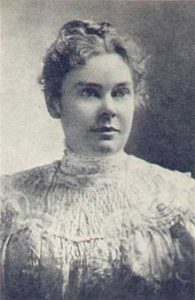 Lizzie Borden, born July 19, 1860, was tried in court for the murder of her stepmother, Abby Borden, and father, Andrew Borden. Although she was acquitted, no other person was accused and she remains infamous for their murders. The murders occurred on August 4, 1892, in Fall River, Massachusetts. Her father’s body was discovered on the couch in the living room and her stepmother’s body was found in the upstairs bedroom. Lizzie claimed to have discovered the body of her father about 30 minutes after he came home from his morning errands. Shortly after, the maid, Bridget Sullivan, found the body of Lizzie’s stepmother. Both victims were killed by crushing blows to the head by a hatchet.
Lizzie Borden, born July 19, 1860, was tried in court for the murder of her stepmother, Abby Borden, and father, Andrew Borden. Although she was acquitted, no other person was accused and she remains infamous for their murders. The murders occurred on August 4, 1892, in Fall River, Massachusetts. Her father’s body was discovered on the couch in the living room and her stepmother’s body was found in the upstairs bedroom. Lizzie claimed to have discovered the body of her father about 30 minutes after he came home from his morning errands. Shortly after, the maid, Bridget Sullivan, found the body of Lizzie’s stepmother. Both victims were killed by crushing blows to the head by a hatchet.
It was said that Lizzie did not get along well with her stepmother, and that they had a falling out years before the murder occurred. Lizzie and her sister, Emma Borden, were also known to have conflicts with their father. They disagreed with his decisions regarding the division of their family’s property. Her father was also responsible for killing her pigeons that were housed in the family barn. Just before the murders occurred, the entire family fell ill. Since Mr. Borden was not a well-liked man in town, Mrs. Borden believed foul play was involved. Although Mrs. Borden believed they had been poisoned, it was discovered that they ingested contaminated meat and contracted food poisoning. The contents of their stomach were investigated for toxins following death; however, no conclusions were achieved.
Lizzie was then arrested on August 11, 1892. She was indicted by a grand jury; however, the trial didn’t begin until June 1893. The hatchet was discovered by the Fall River police; however, it appeared to have been cleaned of any evidence. A downfall for the prosecution occurred when the Fall River police didn’t properly execute collection of the newly discovered forensic fingerprint evidence. Therefore, no potential prints were lifted from the murder weapon. Although no blood-stained clothing was found as evidence, it was reported that Lizzie tore apart and burned a blue dress in the kitchen stove a few days following the murder because it was covered in baseboard paint. Based on the lack of evidence and a few excluded testimonies, Lizzie Borden was acquitted for the murder of her father and stepmother.
Following the trial, Lizzie and her sister Emma resided together in a home for the next few years. However, Lizzie and her sister slowly grew apart and eventually went their separate ways. Once she and her sister separated, she was no longer referred to as Lizzie Borden, but as Lizbeth A. Borden. The last year of Lizzie’s life was spent ill. When she finally passed, the announcement was not made public and only a few attended her burial. There are many different suggestive theories to determine if Lizzie committed the murders or not. Stories range from the maid committing the murders to Lizzie suffering from fugue state seizures.
